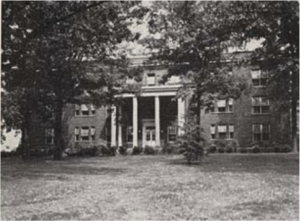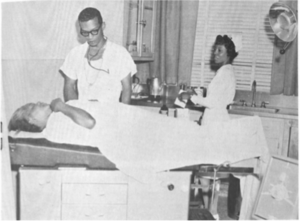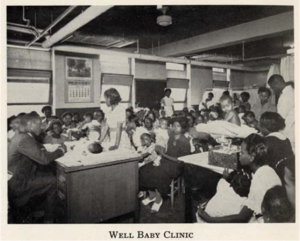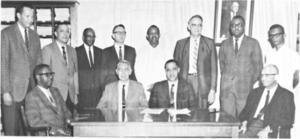Lincoln Hospital (Durham, North Carolina)
Lincoln Hospital (Durham, North Carolina) was a pivotal healthcare institution serving the African American community in Durham, North Carolina, from its inception in 1901 until its closure in 1976. Established during an era of widespread racial segregation in the United States, Lincoln Hospital was a beacon of hope and a vital resource for black Americans in Durham and the surrounding areas, providing essential medical services at a time when access to quality healthcare was severely limited for African Americans.
History[edit | edit source]
The origins of Lincoln Hospital can be traced back to the philanthropic efforts of Washington Duke, a prominent industrialist and philanthropist, and Dr. Aaron M. Moore, the first African American physician in Durham. Recognizing the urgent need for medical facilities accessible to the black community, they collaborated to establish a hospital that would serve this underserved population. Lincoln Hospital was thus founded in 1901, with initial funding provided by the Duke family, and it quickly became an integral part of Durham's African American community.
Throughout its history, Lincoln Hospital was not only a healthcare facility but also a center for medical education and training for African Americans. It hosted a nursing school, which was established in 1903, to provide training and education for black nurses, further addressing the racial disparities in healthcare and education.
Facilities and Services[edit | edit source]
Lincoln Hospital was equipped with a range of medical facilities and services designed to meet the healthcare needs of the African American community. It included inpatient and outpatient services, surgical units, and specialized departments for treating various medical conditions. The hospital played a crucial role in improving public health outcomes among African Americans in the region, offering services that were otherwise inaccessible due to racial segregation policies prevalent in other healthcare institutions.
Impact and Legacy[edit | edit source]
The impact of Lincoln Hospital on the Durham community and beyond was profound. It not only provided essential healthcare services but also represented a significant step forward in the fight against racial inequality in the medical field. The hospital served as a training ground for black medical professionals, many of whom went on to make significant contributions to medicine and public health.
The closure of Lincoln Hospital in 1976 marked the end of an era but its legacy lives on. The hospital's commitment to serving the African American community and its contributions to medical education and public health continue to be celebrated. Today, the history of Lincoln Hospital is remembered as a testament to the resilience and determination of the African American community in Durham and a reminder of the ongoing struggle for racial equality in healthcare.
See Also[edit | edit source]
- History of African Americans in Durham, North Carolina
- Racial segregation in the United States
- Healthcare in the United States
Search WikiMD
Ad.Tired of being Overweight? Try W8MD's physician weight loss program.
Semaglutide (Ozempic / Wegovy and Tirzepatide (Mounjaro / Zepbound) available.
Advertise on WikiMD
|
WikiMD's Wellness Encyclopedia |
| Let Food Be Thy Medicine Medicine Thy Food - Hippocrates |
Translate this page: - East Asian
中文,
日本,
한국어,
South Asian
हिन्दी,
தமிழ்,
తెలుగు,
Urdu,
ಕನ್ನಡ,
Southeast Asian
Indonesian,
Vietnamese,
Thai,
မြန်မာဘာသာ,
বাংলা
European
español,
Deutsch,
français,
Greek,
português do Brasil,
polski,
română,
русский,
Nederlands,
norsk,
svenska,
suomi,
Italian
Middle Eastern & African
عربى,
Turkish,
Persian,
Hebrew,
Afrikaans,
isiZulu,
Kiswahili,
Other
Bulgarian,
Hungarian,
Czech,
Swedish,
മലയാളം,
मराठी,
ਪੰਜਾਬੀ,
ગુજરાતી,
Portuguese,
Ukrainian
Medical Disclaimer: WikiMD is not a substitute for professional medical advice. The information on WikiMD is provided as an information resource only, may be incorrect, outdated or misleading, and is not to be used or relied on for any diagnostic or treatment purposes. Please consult your health care provider before making any healthcare decisions or for guidance about a specific medical condition. WikiMD expressly disclaims responsibility, and shall have no liability, for any damages, loss, injury, or liability whatsoever suffered as a result of your reliance on the information contained in this site. By visiting this site you agree to the foregoing terms and conditions, which may from time to time be changed or supplemented by WikiMD. If you do not agree to the foregoing terms and conditions, you should not enter or use this site. See full disclaimer.
Credits:Most images are courtesy of Wikimedia commons, and templates Wikipedia, licensed under CC BY SA or similar.
Contributors: Prab R. Tumpati, MD






